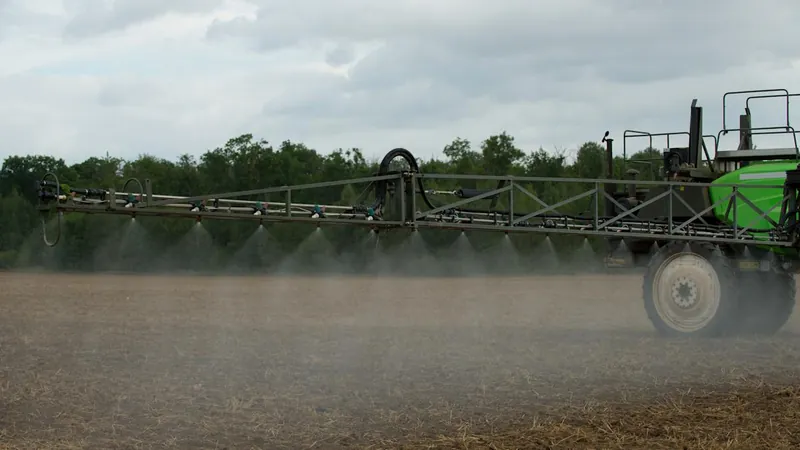
Shocking Study Reveals Pesticides Are a Threat to Nearly Every Species: Is There Hope for Our Ecosystems?
2025-04-08
Author: Ying
What’s the Latest Research Saying?
Published in the prestigious journal *Nature Communications*, this extensive study represents one of the largest examinations of pesticide impacts globally, spearheaded by an international team from the United Kingdom and China. "Our study provides an unparalleled insight into the consequences of pesticide use on the natural environment globally," co-author Ben Woodcock expressed in a recent press release.
By meticulously analyzing over 1,700 studies covering agricultural, commercial, and domestic pesticide use, researchers concluded that the adverse effects are not only "overwhelming" but shockingly pervasive across hundreds of species. These consequences include detrimental impacts on reproductive health, growth patterns, hunting and foraging efficiency, metabolism, and mating rituals. Tragically, pesticide use often leads to premature death and significant population declines among various species.
Dave Goulson, another researcher on the project, noted, "It is often assumed that pesticides are toxic primarily to the target pest and closely related organisms, but this is clearly not true. Concerningly, we found pervasive negative impacts across plants, animals, fungi, and microbes, threatening the very fabric of ecosystems."
Why Are Pesticides Still in Widespread Use?
Despite overwhelming evidence showcasing the detrimental impacts of pesticides, their usage persists. Woodcock points out that contemporary agricultural systems heavily rely on these chemicals to function effectively. "Pesticides are a necessary evil, without which global food production and the livelihoods of farmers would likely collapse," he cautioned. However, he stressed the urgency for re-evaluating current practices and policies to mitigate their extensive use.
Biodiversity—the variety of life on Earth—serves as a cornerstone for human survival, providing essential resources such as food, shelter, fuel, and medicine. It is also critical for the ecosystem services we often take for granted, including pollination, climate regulation, water purification, nutrient cycling, and pest control.
Steps Toward Solution: Mitigating Negative Impacts
Recognizing the looming threats, researchers have suggested innovative strategies to curtail pesticide applications. Some regions, including over 10% of agricultural land in the European Union, are leading the charge by promoting areas free from synthetic pesticides.
One promising alternative advocated by scientists is the cultivation of wildflowers. This approach not only enhances beauty and biodiversity but also attracts natural predators like ladybugs, beetles, and various wildlife such as frogs and birds—natural allies in pest control. Furthermore, advancements in technology, particularly artificial intelligence, offer exciting prospects for the future. Imagine farmers using cameras to monitor pest activity, enabling timely and targeted responses that reduce pesticide dependency.
The findings from this comprehensive study act as a wake-up call. They compel us to reconsider our agricultural practices, not merely for the sake of human food production but for the health of our planet's ecosystems. The time has come to explore sustainable practices that protect both biodiversity and the livelihoods of farmers. The question remains: will we act swiftly enough to save our ecosystems from a crisis of our own making?




 Brasil (PT)
Brasil (PT)
 Canada (EN)
Canada (EN)
 Chile (ES)
Chile (ES)
 Česko (CS)
Česko (CS)
 대한민국 (KO)
대한민국 (KO)
 España (ES)
España (ES)
 France (FR)
France (FR)
 Hong Kong (EN)
Hong Kong (EN)
 Italia (IT)
Italia (IT)
 日本 (JA)
日本 (JA)
 Magyarország (HU)
Magyarország (HU)
 Norge (NO)
Norge (NO)
 Polska (PL)
Polska (PL)
 Schweiz (DE)
Schweiz (DE)
 Singapore (EN)
Singapore (EN)
 Sverige (SV)
Sverige (SV)
 Suomi (FI)
Suomi (FI)
 Türkiye (TR)
Türkiye (TR)
 الإمارات العربية المتحدة (AR)
الإمارات العربية المتحدة (AR)